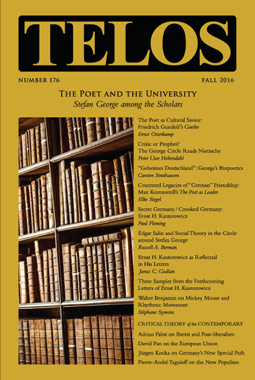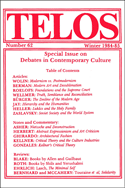By Anna G. Keller · Tuesday, April 7, 2020 Social and economic disruptions in the wake of this spring’s virus will be unevenly distributed in intensity and time. Socially distanced rural suffering will long outlast the news cycle and panic.
 COVID-19 is a real crisis. It is unique for being concentrated for once in places where global travelers, professionals, and creatives live. When risk for those populations is controlled to a level they can accept, expect panic and restrictions to ease. Our world happily tolerates death tolls far in excess of the worst projected for COVID-19 when only rural people or people with a high school education or less are at high risk. COVID-19 is a real crisis. It is unique for being concentrated for once in places where global travelers, professionals, and creatives live. When risk for those populations is controlled to a level they can accept, expect panic and restrictions to ease. Our world happily tolerates death tolls far in excess of the worst projected for COVID-19 when only rural people or people with a high school education or less are at high risk.
Kentucky, where I live, expects our COVID-19 crisis to peak on Saturday, May 16, with 1,600 hospitalized and 240 in ICU beds on that day. By then, New York is expected to no longer need any COVID-19 beds. Their peak will have been a month and a half previous. Kentucky (more accurately, Lexington and Louisville) will probably be fine when we peak. Tennessee (e.g., Nashville and Memphis) probably won’t. Expect the news to have moved on by then.
Continue reading →
By Ellen Hinsey · Thursday, July 13, 2017 In the wake of the Brexit vote and the 2016 American presidential election, the idea began to circulate that we were witnessing a trans-Atlantic, populist “revolt against the elites,” which had spontaneously arisen from populations whose concerns had, for too long, gone unheard by those in power. Longstanding economic problems regarding income disparity and wealth—left unaddressed by both sides of the political spectrum—are indeed among the most pressing issues that we currently face. But as has been observed, the first half-year of the new U.S. presidential administration, with one of the wealthiest cabinets in American history, calls into question the validity of the “populist” interpretation in the U.S. context. The failure of this theory has in turn exposed a gap in our ability to conceptualize what actually happened during the U.S. election, what is unfolding before us, and how we got here.
Continue reading →
By Fred Siegel · Tuesday, November 15, 2016 The public opinion pollsters have failed four times in the last 18 months. They thought that Netanyahu would be defeated in the contest for Israel’s prime ministership. They did not foresee the defeat of the peace referendum in Colombia. They were sure that Brexit would be defeated in Great Britain, and they were equally sure (with the exception of a few outliers like the LA Times longitudinal poll) that Hillary would be our 45th president. In all four cases the surveys reflected the pollsters’ attitudes but not the public’s. Like the New York Times, which has been eating crow over its election coverage, the pollsters need to get out in to the countryside more. The same holds true for the Hillary operatives who were caught by surprise. As a DNC source explained “it was all about analytics with them. . . . They were too reliant on analytics and not enough on instinct and human intel from the ground.”
Continue reading →
By Russell A. Berman · Wednesday, October 26, 2016 In addition to exploring the history and legacy of the George Circle, Telos 176 (Fall 2016) features a special section of topical writing, introduced here by Russell A. Berman, that continues our ongoing commitment to setting forth a critical theory of the contemporary. Telos 176 is now available for purchase in our store.
 For nearly half a century, Telos has sustained a discussion of critical theory, broadly understood, encompassing various and diverse intellectual traditions and individual thinkers whose work points toward trenchant examinations of our contemporary society and culture. Articles published in the journal operate in various registers—philosophy, political theory, intellectual history, cultural criticism, or more generically “theory”—but despite this range of disciplinary idioms, they each contribute directly or indirectly to the ongoing elaboration of an examination of the present. Beyond their import as contributions to their respective academic fields, Telos articles enhance our ability to articulate the ongoing and constantly evolving critical theory of the contemporary. For nearly half a century, Telos has sustained a discussion of critical theory, broadly understood, encompassing various and diverse intellectual traditions and individual thinkers whose work points toward trenchant examinations of our contemporary society and culture. Articles published in the journal operate in various registers—philosophy, political theory, intellectual history, cultural criticism, or more generically “theory”—but despite this range of disciplinary idioms, they each contribute directly or indirectly to the ongoing elaboration of an examination of the present. Beyond their import as contributions to their respective academic fields, Telos articles enhance our ability to articulate the ongoing and constantly evolving critical theory of the contemporary.
Continue reading →
By Telos Press · Monday, July 14, 2014  Telos Press Publishing is happy to announce that Joel Kotkin’s The New Class Conflict is now available for pre-order. The book will be released on September 1, 2014.Pre-order your copy here, and we will ship it as soon as it becomes available. Telos Press Publishing is happy to announce that Joel Kotkin’s The New Class Conflict is now available for pre-order. The book will be released on September 1, 2014.Pre-order your copy here, and we will ship it as soon as it becomes available.
Continue reading →
By Beau Mullen · Wednesday, January 22, 2014 As an occasional feature on TELOSscope, we highlight a past Telos article whose critical insights continue to illuminate our thinking and challenge our assumptions. Today, Beau Mullen looks at Martin Jay’s “Hierarchy and the Humanities: The Radical Implications of a Conservative Idea” from Telos 62 (Winter 1984).
 The notion of “high culture” has been under attack in different ways by critics, academics, and the general public for generations. Moreover, as Western culture becomes increasingly commercialized, egalitarian impulses have exiled much of what was considered by many to be high culture to obscurity, appreciated mainly by a minority who are themselves regarded as cultural elitists. Popular or mass culture appears to now reign supreme, but this does not mean that cultural hierarchy has been brought to an end. Cultural hierarchy still has its defenders, and as Martin Jay suggests in his 1984 Telos article “Hierarchy and the Humanities: The Radical Implications of a Conservative Idea,” it clearly has a place in current cultural evaluations. The notion of “high culture” has been under attack in different ways by critics, academics, and the general public for generations. Moreover, as Western culture becomes increasingly commercialized, egalitarian impulses have exiled much of what was considered by many to be high culture to obscurity, appreciated mainly by a minority who are themselves regarded as cultural elitists. Popular or mass culture appears to now reign supreme, but this does not mean that cultural hierarchy has been brought to an end. Cultural hierarchy still has its defenders, and as Martin Jay suggests in his 1984 Telos article “Hierarchy and the Humanities: The Radical Implications of a Conservative Idea,” it clearly has a place in current cultural evaluations.
Continue reading →
|
|
 COVID-19 is a real crisis. It is unique for being concentrated for once in places where global travelers, professionals, and creatives live. When risk for those populations is controlled to a level they can accept, expect panic and restrictions to ease. Our world happily tolerates death tolls far in excess of the worst projected for COVID-19 when only rural people or people with a high school education or less are at high risk.
COVID-19 is a real crisis. It is unique for being concentrated for once in places where global travelers, professionals, and creatives live. When risk for those populations is controlled to a level they can accept, expect panic and restrictions to ease. Our world happily tolerates death tolls far in excess of the worst projected for COVID-19 when only rural people or people with a high school education or less are at high risk. 
 Telos Press Publishing is happy to announce that Joel Kotkin’s The New Class Conflict is now available for pre-order. The book will be released on September 1, 2014.
Telos Press Publishing is happy to announce that Joel Kotkin’s The New Class Conflict is now available for pre-order. The book will be released on September 1, 2014. The notion of “high culture” has been under attack in different ways by critics, academics, and the general public for generations. Moreover, as Western culture becomes increasingly commercialized, egalitarian impulses have exiled much of what was considered by many to be high culture to obscurity, appreciated mainly by a minority who are themselves regarded as cultural elitists. Popular or mass culture appears to now reign supreme, but this does not mean that cultural hierarchy has been brought to an end. Cultural hierarchy still has its defenders, and as Martin Jay suggests in his 1984 Telos article “Hierarchy and the Humanities: The Radical Implications of a Conservative Idea,” it clearly has a place in current cultural evaluations.
The notion of “high culture” has been under attack in different ways by critics, academics, and the general public for generations. Moreover, as Western culture becomes increasingly commercialized, egalitarian impulses have exiled much of what was considered by many to be high culture to obscurity, appreciated mainly by a minority who are themselves regarded as cultural elitists. Popular or mass culture appears to now reign supreme, but this does not mean that cultural hierarchy has been brought to an end. Cultural hierarchy still has its defenders, and as Martin Jay suggests in his 1984 Telos article “Hierarchy and the Humanities: The Radical Implications of a Conservative Idea,” it clearly has a place in current cultural evaluations. 






